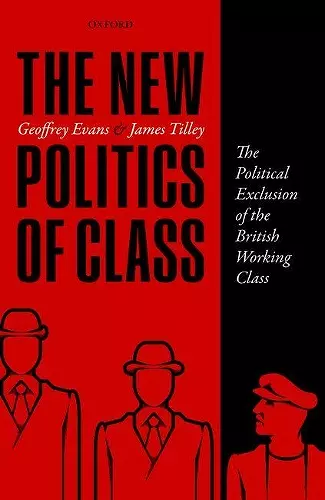The New Politics of Class
The Political Exclusion of the British Working Class
Geoffrey Evans author James Tilley author
Format:Hardback
Publisher:Oxford University Press
Published:23rd Feb '17
Currently unavailable, currently targeted to be due back around 17th December 2025, but could change

This book explores the new politics of class in 21st century Britain. It shows how the changing shape of the class structure since 1945 has led political parties to change, which has both reduced class voting and increased class non-voting. This argument is developed in three stages. The first is to show that there has been enormous social continuity in class divisions. The authors demonstrate this using extensive evidence on class and educational inequality, perceptions of inequality, identity and awareness, and political attitudes over more than fifty years. The second stage is to show that there has been enormous political change in response to changing class sizes. Party policies, politicians' rhetoric, and the social composition of political elites have radically altered. Parties offer similar policies, appeal less to specific classes, and are populated by people from more similar backgrounds. Simultaneously the mass media have stopped talking about the politics of class. The third stage is to show that these political changes have had three major consequences. First, as Labour and the Conservatives became more similar, class differences in party preferences disappeared. Second, new parties, most notably UKIP, have taken working class voters from the mainstream parties. Third, and most importantly, the lack of choice offered by the mainstream parties has led to a huge increase in class-based abstention from voting. Working class people have become much less likely to vote. In that sense, Britain appears to have followed the US down a path of working class political exclusion, ultimately undermining the representativeness of our democracy. They conclude with a discussion of the Brexit referendum and the role that working class alienation played in its historic outcome.
This is a book of outstanding academic and political importance. It reveals the changing relationship between social class and party support over recent decades and brings out the far-reaching implications for British political life in the post-Brexit era. * John Goldthorpe, Fellow, Nuffield College, University of Oxford. *
In a masterly analysis of long-term social and political change in Britain, Evans and Tilley show that people's class position still influences their values - but that this class divide is now little reflected at the ballot box. Their findings leave us pondering whether social democratic parties like Labour can successfully adapt to a world in which the university graduate is coming to be more commonplace than the manual worker. * John Curtice, Professor of Politics, University of Strathclyde. *
This book challenges the prevailing view that class politics in Britain is no more. It provides an important corrective to conventional wisdom regarding the decline of class, and a vital contribution to understanding the falling turnout of the working class. * Jan Leighley, Professor of Political Science, American University. *
This book demonstrates that class politics is alive in Britain, but has taken on a new shape. The size and make-up of classes have changed, yet their distinctive preferences remain. It is the strategic reactions of office-seeking parties to these changes in class proportions, above all that of the Labour Party, that explain why classes have realigned their partisan affiliations. Splendidly captured through the lens of British politics, this book more generally illustrates the core political dynamics of post-industrial democratic capitalism. * Herbert Kitschelt, George V. Allen Professor of International Relations, Duke University. *
ISBN: 9780198755753
Dimensions: 241mm x 161mm x 21mm
Weight: 502g
252 pages